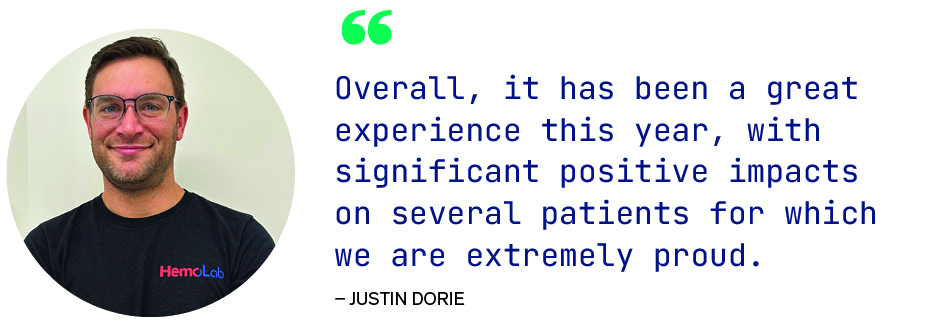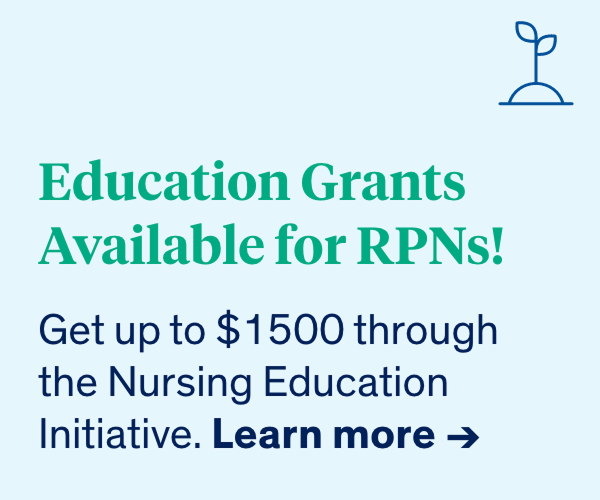As part of our research strategy, WeRPN is committed to growing the body of knowledge about the RPN role and the contributions that RPNs make to the health system. To help support this goal, each year, WeRPN provides funding for two RPN research fellowships up to a maximum of $12,500 each.
The research fellowships provide opportunities for RPNs to build applied research knowledge capacity and capability in “real-world” contexts, facilitate a culture of curiosity and clinical practice improvements, and nurture confidence and competence in leading small-scale research studies for RPNs. Read on to learn about the experience of two RPNs who recently participated in the program and shared their stories. Hear about their projects focusing on the RPN experience, what the research fellowship process was like, how the role of the RPN in research and clinical practice was valued and elevated within these workplaces and how this could be you in the future.

AT THE Lilibeth Caberto Kidney Clinical Research Unit in London, Ontario, RPNs are advancing their knowledge and providing exceptional care to some of the most complex hemodialysis (HD) patients. These are individuals who may be experiencing low energy, an inability to complete activities of daily living or things they enjoy doing, low quality of life, shortness of breath, extremely low blood pressure, extreme bodily itch, volume overload with difficulty removing fluid, as well as overcoming surrounding body weight and image. These are patients who do not qualify for kidney transplants. Justin Dorie, RPN, was awarded a 2022-23 WeRPN Research Fellowship to research developing and implementing a personalized Patient Optimization (OP) and Education Program. This new innovative approach creates an environment that fosters collaboration between patients, RPNs and the other clinical care team members within the Renal Care Program. “This provided an opportunity…to utilize my personalized skills as an RPN with hemodialysis experience within an innovative setting to showcase the versatility that an RPN can offer,” says Justin. Initial interest in the program was overwhelming and very exciting for Justin.
Justin conducted an initial assessment with the patient and the team. This would consist of a thorough volume status assessment before a more fulsome team care planning session that resulted in the creation of a new individualized plan of care. Next, the patient would participate in five treatment sessions followed by small, planned and closely monitored treatment changes. These changes could include a slowly increased target weight, removing less fluid during each HD session, and patient education on topics such as fluid status, body weight gain vs. fluid weight gain, salt intake, cardiovascular status and the effects of HD on the contractility of the heart, medication use and other reasons for decreased energy levels. Overall, 11 patients were referred to the program, 5 completed an OP, three are awaiting their OP, and a final three declined to begin an OP.
By the end of the program, patients experienced less overall circulatory stress caused by each HD session. Blood pressures improved during HD, and better cardiac contractility compensatory regulation was restored. All the patients reported increased energy and ability to do more activities on their non-HD days. Remarkably, one patient’s symptoms improved, allowing eligibility and successfully receiving a kidney transplant.
The research noted that many patients do not realize their treatment options, and the intense optimization program normalized difficult conversations to make better-informed decisions about the goals of care. With one patient in particular, the researchers measured and analyzed the patient’s bodily salt content through sodium MRI to reduce an unbearable bodily itch and improve quality of life. However, further in-depth conversations with the patient and family enabled the patient to decide that they no longer wanted to be on HD and allowed them to pass away on their own terms.
All patients have recognized the value of the recommended modifications, and the HD experience is much more constructive. The feedback to date has been extremely positive, which is very encouraging for the future of the Optimization Program.
Feedback from patients:
- Had an amazing day – able to run multiple errands without resting, shortness of breath or dizziness (best day I’ve had in a long time!).
- Feeling better than I have in years!
- Good start to the program, feeling confident in the team who are professional and caring – good communication about the process and what is possible.
- Family and friends are noticing increased energy levels and ability to do more things (yard work, exercise, motorcycle rides with friends).
- Feeling very grateful to have been able to participate in this program. It has meant a significant improvement in my quality of life (better BPs, stamina, energy, no shortness of breath, less weakness). I can now go out and do things I haven’t been able to in years!
- The Optimization Program has been a glimmer of light in a long tunnel!
Researchers identified several factors that helped improve and optimize care:
- engagement and information sharing across professional teams
- strong desire for patients to be reactivated on the kidney transplant list
- robust patient education, including use of graphics and ensuring patient understands new recommendations
- the intense individual monitoring of the patient’s compensatory regulation, such as carnitine deficiencies, medication reviews
From patient engagement and feedback, Justin would like others to know that assuming the role of a research coordinator has expanded his knowledge and expertise as an RPN.
“Overall, it has been a great experience this year, with significant positive impacts on several patients for which we are extremely proud.”
Justin reports that he feels fortunate for the experience, for what he can now provide his patients, and he feels even more driven to continue to grow and offer more services to more patients. The experience has also encouraged him to reflect on his own career path with continuing education. The RPN research fellowship award allowed Justin to take a vision and make it a reality for these highly complex patients. He sums it up nicely, “Thank you, WeRPN, for this extremely beneficial learning opportunity!”

JEN CALVER was drawn to the WeRPN Fellowship to enhance her capacity as an RPN researcher. Her academic mentor, Dr. Winnie Sun, had an existing partnership with a Regional Municipality in Southern Ontario to conduct a research study to explore barriers and facilitators for staffing stability from the perspective of staff nurses (RPNs/RNs) and personal support workers (PSWs) in four long-term care homes. After learning about the RPN fellowship opportunity, the partner organization was very pleased to offer an executive sponsorship and in-kind contribution to support the application and research fellowship.
Jen had three key objectives for her fellowship. First, to acquire skills in applied research and knowledge translation activities that would provide evidence to inform workforce retention in long-term care (LTC). Second, to be mentored and guided through individualized research experiences in a collaborative research partnership. Last, to consolidate skills in research methodologies, including qualitative or quantitative study designs.
Under the mentorship and guidance of Dr. Sun, Jen was introduced to the larger research team and organizational partners to learn about the development of the study’s design, the creation of survey instruments and pilot testing and the data collection process. For Jen, a valuable teaching moment during her fellowship was gaining a better understanding of the distinction between performance assessments and the evaluation of an organization, its employees or students, compared to research that required approval for ethical conduct for research involving humans. If RPNs are interested in learning about ethical conduct for research involving humans, the Panel on Research Ethics offers a free self-paced certificate course.
“It is exciting to see RPNs contributing to the research process as team members and participating as research participants to inform evidence that guides our professional practice in clinical, education and leadership roles,” says Jen.
During her fellowship, Jen engaged in regular meetings with the research team, conducted literature reviews, enhanced her knowledge of thematic analysis and descriptive statistics and contributed to the analysis, interpretation and writing of findings. She presented preliminary findings at WeRPN’s Research Symposium, co-developed and presented at professional conferences and to the senior leadership team. She also had an opportunity to co-author the final report for the partnering organization and is contributing to a manuscript to be submitted for peer-review publication this fall.
Following her research fellowship, Jen joined WeRPN as a research coordinator to support any RPN interested in learning more about research or how they can become involved. Jen has heard many RPNs express that they feel undervalued in the workplace and that their voices go unheard. Engaging in research as a team member, as a research participant or by attending research events is an excellent way to inform evidence that guides our practice, policies, models of care and management.
WeRPN invites RPNs to apply for funding for research fellowships co-sponsored by their employer or a partnering organization. RPNs can receive up to $12,500.00. Calls for 2024–25 fellowship proposals will be opening in Fall 2023. Stay tuned!
Contact Jen Calver at jcalver@werpn.com for more information or further details about how to apply.
